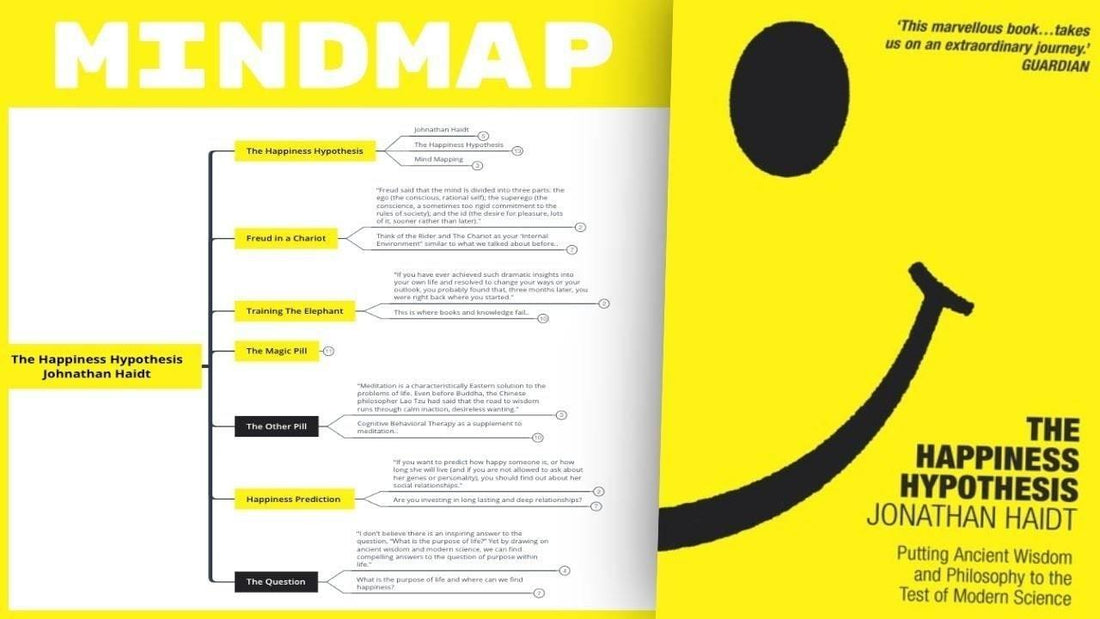Video Book Summary
Download all of the Mind Maps here.
Book Summary Notes
The Happiness Hypothesis
“Where does happiness come from? There are several different “happiness hypotheses.”
"One is that happiness comes from getting what you want, but we all know (and research confirms) that such happiness is short-lived."
"A more promising hypothesis is that happiness comes from within and cannot be obtained by making the world conform to your desires. This idea was widespread in the ancient world: Buddha in India and the Stoic philosophers in ancient Greece and Rome all counseled people to break their emotional attachments to people and events, which are always unpredictable and uncontrollable, and to cultivate instead an attitude of acceptance."
"This ancient idea deserves respect, and it is certainly true that changing your mind is usually a more effective response to frustration than is changing the world. However, I will present evidence that this second version of the happiness hypothesis is wrong. Recent research shows that there are some things worth striving for; there are some external conditions of life that can make you lastingly happier."
"I’ll suggest that the happiness hypothesis offered by Buddha and the Stoics should be amended: Happiness comes from within, and happiness comes from without. We need the guidance of both ancient wisdom and modern science to get the balance right.”
Where does happiness come from? Well.. It depends! "It Depends" seems to be the answer to almost every single question..
Johnathan points out here that there are at least two variables to happiness!
- The Internal Environment
- The External Environment
Which then should we be focused on?
Well.. It depends!
Happiness can be best setup by developing both of these environments (which we'll talk about later) but ignore either side of the hypothesis at your own peril.
Freud in a Chariot
“Freud said that the mind is divided into three parts: the ego (the conscious, rational self); the superego (the conscience, a sometimes too rigid commitment to the rules of society); and the id (the desire for pleasure, lots of it, sooner rather than later)."
"The metaphor I use when I lecture on Freud is to think of the mind as a horse and buggy (a Victorian chariot) in which the driver (the ego) struggles frantically to control a hungry, lustful, and disobedient horse (the id) while the driver’s father (the superego) sits in the back seat lecturing the driver on what he’s doing wrong."
"For Freud, the goal of psychoanalysis was to escape this pitiful state by strengthening the ego, thus giving it more control over the id and more independence from the superego.”
Think of the Rider and The Chariot as your 'Internal Environment" similar to what we talked about before..
These characters are all playing a part in your state of being daily..
The ID is laziness, gluttony and procrastination
The Superego is all the judgement you give yourself for those things
The Ego is what you think of as your 'self' and is the clear thinking and rational side of yourself
Can you take some time to notice and name each character in your thoughts?
- Who's popping up the most?
- Who's voice feels the most powerful?
Training The Elephant
“If you have ever achieved such dramatic insights into your own life and resolved to change your ways or your outlook, you probably found that, three months later, you were right back where you started."
"Epiphanies can be life-altering, but most fade in days or weeks. The rider can’t just decide to change and then order the elephant to go along with the program. Lasting change can come only by retraining the elephant, and that’s hard to do."
"When pop psychology programs are successful in helping people, which they sometimes are, they succeed not because of the initial moment of insight but because they find ways to alter people’s behavior over the following months. They keep people involved with the program long enough to retrain the elephant.”
This is where books and knowledge fail..
Don't get me wrong obviously I'm a big fan of books and information! But when it comes to lasting change they just don't cut it..
Some of the people close to me think I'm crazy for having coaches in each area of my life I want to improve!
- But I have come to know 'through lots of trial and error' that no matter how much information I have.. Quite often I'm at the mercy of the elephant!
- Coaching and accountability are one of the key ways I personally use to overcome the momentum of that elephant..
This may sound weird.. But most of my coaching clients already know what to do!
- Whether they want to grow their business..
- Become more productive..
- Learn more effectively..
- The thing I help them with is simply training the elephant!
Click the link below to sign up for a Sample Coaching Session! (Completely Free)
The Magic Pill
“Suppose you read about a pill that you could take once a day to reduce anxiety and increase your contentment. Would you take it?"
"Suppose further that the pill has a great variety of side effects, all of them good: increased self-esteem, empathy, and trust; it even improves memory. Suppose, finally, that the pill is all natural and costs nothing. Now would you take it?"
"The pill exists. It’s called meditation.”
Meditation is one of the most effective ways (along with coaching) to tame the elephant..
Quite simply the elephant acts on impulse..
- Those impulses quite often get you off track..
- Cause procrastination, overeating or emotional outbursts.
That only works when the Ego isn't aware enough to spot that impulse and label it what it truly is..
Meditation not only helps you become aware of those impulses.. But it will help you learn how to deal with them effectively!
- Meditation is free.. but it's also the best investment you'll ever make!
- People who meditate are able to make changes quicker as well as deal with emotional discomfort more effectively..
The Other Pill
“Meditation is a characteristically Eastern solution to the problems of life. Even before Buddha, the Chinese philosopher Lao Tzu had said that the road to wisdom runs through calm inaction, desireless wanting."
"Western approaches to problems more typically involve pulling out a tool box and trying to fix what’s broken. That was Lady Philosophy’s approach with her many arguments and reframing techniques. The toolbox was thoroughly modernized in the 1960s by Aaron Beck.”
“Depressed people are caught in a feedback loop in which distorted thoughts cause negative feelings, which then distort thinking further. Beck’s discovery is that you can break the cycle by changing the thoughts."
"A big part of cognitive therapy is training clients to catch their thoughts, write them down, name the distortions, and then find alternative and more accurate ways of thinking. Over many weeks, the client’s anxiety or depression abates. Cognitive therapy works because it teaches the rider how to train the elephant rather than how to defeat it directly in an argument.”
Cognitive Behavioral Therapy as a supplement to meditation..
Haidt tells us in the book that if we're feeling down in the dumps that we should check in on our thoughts!
What are the thoughts we're having right now?
- How might they be distorted or untrue?
- How might I challenge this thought?
The behavioral part of CBT says that instead of laying in bed all day ruminating on our thoughts we should..
- Choose to do something small
- Get out of bed and read a newspaper
- Make the bed
- Cook breakfast
- Something to get you out of the cycle
Happiness Prediction
“If you want to predict how happy someone is, or how long she will live (and if you are not allowed to ask about her genes or personality), you should find out about her social relationships."
"Having strong social relationships strengthens the immune system, extends life (more than does quitting smoking), speeds recovery from surgery, and reduces the risks of depression and anxiety disorders."
"It’s not just that extroverts are naturally happier and healthier; when introverts are forced to be more outgoing, they usually enjoy it and find that it boosts their mood. Even people who think they don’t want a lot of social contact still benefit from it."
Are you investing in long lasting and deep relationships?
This is something I find easy to take for granted..
While pursuing my own personal development I find it easy to isolate myself!
- How about you? How is your social life?
- I know I tend to think I don't 'need' much social interaction but that seems to be proven false!
So here we have it! We can best serve our own happiness by finding long lasting and deep relationships..
- Maybe those with family, long term friends or joining groups with similar ideologies.
- What could you do to work on forging those relationships?
The Question
“I don’t believe there is an inspiring answer to the question, “What is the purpose of life?” Yet by drawing on ancient wisdom and modern science, we can find compelling answers to the question of purpose within life."
"The final version of the happiness hypothesis is that happiness comes from between. Happiness is not something you can find, acquire, or achieve directly. You have to get the conditions right and then wait."
"Some of those conditions are within you, such as coherence among the parts and levels of your personality."
"Other conditions require relationships to things beyond you: Just as plants need sun, water, and good soil to thrive, people need love, work, and a connection to something larger."
"It is worth striving to get the right relationships between yourself and others, between yourself and your work, and between yourself and something larger than yourself. If you get these relationships right, a sense of purpose and meaning will emerge.”
What is the purpose of life and where can we find happiness?
Again the answer is it depends..
But here is a good place to start!
- How is your relationship with your thoughts?
- How are your relationships with people?
- What might you do to improve those areas?

